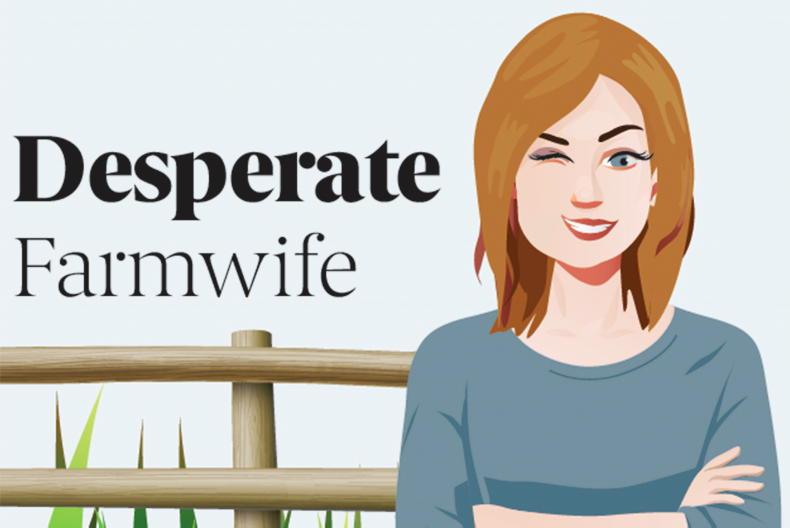The weather has finally turned back to pleasant. We were spoilt in February with a dry and relatively mild month. It was a great start to the season. Then, March of many weathers gave us an awful soaking. The sky was perpetually dark and threatening. It rained persistently; making grazing and grass management challenging. Moods dropped and our stamina was rightly tested. Morning after morning, I hesitated in the garage waiting for a shower to ease off before I’d walk the 400 metres to the yard. Everything seems so much more unpleasant in wet conditions. Despite being well kitted out for inclement weather, I find the wearing of glasses a terrible nuisance. It is impossible to see through wet glasses, so a cleaning ritual has to be done before work begins.
April starts
With the turning of the calendar page onto April, the weather also changed and we seem to be back in a dry spell again. The washing lines are full. You can visibly see the moisture soaking up out of the ground. Muddy cow passages are drying fast and, consequently, jeep tyre tracks and hoof prints are interesting rather than messy. Primroses adorn the edges to a backdrop of lush green grass and clover. The cows are content. They are also getting a shine on their pelts as they lose their winter coats. Tim dropped the ration to 4kgs per cow, which will amount to a substantial saving in input costs for April. That will drop to 2kg next week, as grass growth continues apace.
The last few days have been just lovely; coinciding with the pressure coming off in the yard. There is only one cow left in the shed to calve and the calf pens are starting to empty out. Tim and I have delivered 50 heifers to Kildare to Billy O’Shea, our heifer rearer. They were all born in February to sexed semen, so are a very even bunch. I will struggle to get the last 16 that we plan to send to be as uniform - but they will be close.
Once the cows and heifers that were bred to dairy had calved, the Aberdeen Angus X calves started to arrive. They are fine calves with good conformation, and that has been another benefit of using sexed semen. The value of the calf crop will be up on last year.
Outbreak of scour
We had a small outbreak of scour in one pen of nine calves, and it was challenging. I say challenging because it eats up time; administering electrolytes between feeds while it worked through the group of calves. A fine Angus bull died. I was very disappointed having had such a good run. It had all the hallmarks and smells of Rota virus. It is one of the reasons to keep calf groups small.
At least you can manage and contain it. As the season moved on and we got fatigued, our attention to detail was not as keen as it had been in the earlier weeks. We were leaving the calves with the cows for several hours, observing them sucking rather than doing the job ourselves.
As soon as the calf got sick and we worked backwards, we were suspicious that he didn’t get adequate colostrum. As I’ve often said, it is critical so that the calf receives the antibodies from the cow and develops its immune system. If Rota virus or any other virus gets there first, then it can be a lost battle.
I also had an eight-week old calf get bloat. I gave her 400mls of cooking oil. The vet advised me that it is not effective in a young calf. I didn’t know. So she needed veterinary intervention; treatment and pain relief. I learn something new every year.
Dinner time
On Sunday, we had my mother-in-law, Lil, for dinner along with our own gang. That’s when you really know the pressure is off. The sun beamed in and the windows had to be opened.
I served lamb. Ricky and I collected rosemary from the garden, we prepared carrots, green beans with onion, cabbage with streaky rashers, baked potatoes and gravy flavoured with rosemary and red currant jelly.
Not alone had I time to prepare dinner, I was able to sit down and enjoy it, too.
Read more
Katherine's Country: wedding invitation is a cause for celebration
Katherine's Country: congratulations to An Irish Goodbye
The weather has finally turned back to pleasant. We were spoilt in February with a dry and relatively mild month. It was a great start to the season. Then, March of many weathers gave us an awful soaking. The sky was perpetually dark and threatening. It rained persistently; making grazing and grass management challenging. Moods dropped and our stamina was rightly tested. Morning after morning, I hesitated in the garage waiting for a shower to ease off before I’d walk the 400 metres to the yard. Everything seems so much more unpleasant in wet conditions. Despite being well kitted out for inclement weather, I find the wearing of glasses a terrible nuisance. It is impossible to see through wet glasses, so a cleaning ritual has to be done before work begins.
April starts
With the turning of the calendar page onto April, the weather also changed and we seem to be back in a dry spell again. The washing lines are full. You can visibly see the moisture soaking up out of the ground. Muddy cow passages are drying fast and, consequently, jeep tyre tracks and hoof prints are interesting rather than messy. Primroses adorn the edges to a backdrop of lush green grass and clover. The cows are content. They are also getting a shine on their pelts as they lose their winter coats. Tim dropped the ration to 4kgs per cow, which will amount to a substantial saving in input costs for April. That will drop to 2kg next week, as grass growth continues apace.
The last few days have been just lovely; coinciding with the pressure coming off in the yard. There is only one cow left in the shed to calve and the calf pens are starting to empty out. Tim and I have delivered 50 heifers to Kildare to Billy O’Shea, our heifer rearer. They were all born in February to sexed semen, so are a very even bunch. I will struggle to get the last 16 that we plan to send to be as uniform - but they will be close.
Once the cows and heifers that were bred to dairy had calved, the Aberdeen Angus X calves started to arrive. They are fine calves with good conformation, and that has been another benefit of using sexed semen. The value of the calf crop will be up on last year.
Outbreak of scour
We had a small outbreak of scour in one pen of nine calves, and it was challenging. I say challenging because it eats up time; administering electrolytes between feeds while it worked through the group of calves. A fine Angus bull died. I was very disappointed having had such a good run. It had all the hallmarks and smells of Rota virus. It is one of the reasons to keep calf groups small.
At least you can manage and contain it. As the season moved on and we got fatigued, our attention to detail was not as keen as it had been in the earlier weeks. We were leaving the calves with the cows for several hours, observing them sucking rather than doing the job ourselves.
As soon as the calf got sick and we worked backwards, we were suspicious that he didn’t get adequate colostrum. As I’ve often said, it is critical so that the calf receives the antibodies from the cow and develops its immune system. If Rota virus or any other virus gets there first, then it can be a lost battle.
I also had an eight-week old calf get bloat. I gave her 400mls of cooking oil. The vet advised me that it is not effective in a young calf. I didn’t know. So she needed veterinary intervention; treatment and pain relief. I learn something new every year.
Dinner time
On Sunday, we had my mother-in-law, Lil, for dinner along with our own gang. That’s when you really know the pressure is off. The sun beamed in and the windows had to be opened.
I served lamb. Ricky and I collected rosemary from the garden, we prepared carrots, green beans with onion, cabbage with streaky rashers, baked potatoes and gravy flavoured with rosemary and red currant jelly.
Not alone had I time to prepare dinner, I was able to sit down and enjoy it, too.
Read more
Katherine's Country: wedding invitation is a cause for celebration
Katherine's Country: congratulations to An Irish Goodbye








SHARING OPTIONS